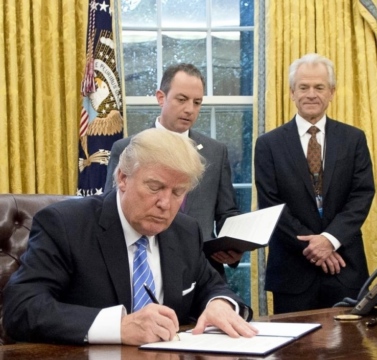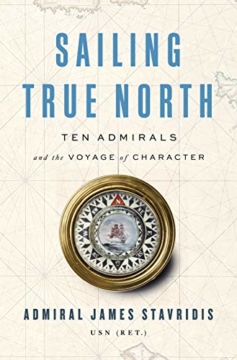
La incertidumbre de Centroamérica ante Trump
Hay una ausencia de claridad acerca de cuál será la manera de trabajar con los Estados Unidos.
Q: In delivering his 2012 posture statement to a congressional committee on March 6, Gen. Douglas Fraser, the head of the United States Southern Command (Southcom), said that the inability of the Central American region to deal with organized crime has "serious implications" for U.S. security. One of Southcom's primary goals is to reduce the threat of organized crime from a national and regional security threat to a "public safety problem," Fraser said. Will Southcom play an important part in tackling transnational organized crime in the region? How effective has Southcom been in advancing U.S. security interests in both Central America and the wider region? What areas should Southcom focus on, and how should its successes be measured? Does it have enough funding to achieve its goals?
A: Gabriel Marcella, adjunct professor at the U.S. Army War College: "The United States Southern Command is the smallest and poorest of the combatant commands. It has dealt with a multitude of problems described within the rubric of low-intensity conflict: insurgency, terrorism, counter-narcotics and humanitarian assistance. Coincidentally, it has engaged Latin American militaries to strengthen professional capacities, build strategic consensus and support democratic civil-military relations. Transnational crime is destroying the social fabric of Central American countries, but the command's ability to respond effectively is limited. The U.S. military cannot train or educate law enforcement personnel; therefore, it cannot deal directly with the crime wave in Central America, even though crime has overwhelmed the modest police capabilities of the countries. It can support law enforcement because it possesses certain assets. For example, military engineers can help build or refurbish an airfield that would allow host country counter-narcotics aircraft to operate safely. The military can also advise governments how to plan strategy. The problem is further intensified by the parallel universes of Central America and Washington. In neither place is there strategic consensus or a road map that remotely resembles the Democratic Security Policy that President Álvaro Uribe implemented so successfully in Colombia. Success was based on the understanding that the problem was far greater than narcotics; the problem was a weak state, weak institutions and lack of territorial control on the part of the government-precisely the conditions in Central America. Governments need to develop their own Democratic Security Policy in order to place the various elements of policy-social and economic development, rule of law, police and military power-in the right balance. It's good advice for Washington, as well."
A: Orlando J. Pérez, chairman of the political science department at Central Michigan University: "Central America is the most violent region of the world. Homicide rates in the northern triangle countries-Honduras, Guatemala and El Salvador-are at least 10 times higher than the world average. This violence is a function of a number of factors, both international and domestic, including a history of political violence, availability of weapons, gangs, drug trafficking, inequality and lack of opportunities for young people, among others. Weak law enforcement and judicial institutions plus the lack of a coordinated regional approach also contribute to the problem. Violence is thus a multidimensional problem. Gen. Fraser's posture statement rightly identifies crime and violence in Central America as a major problem, and one that affects the United States. Southcom has made significant contributions to drug interdiction and to building the capacity of the local militaries though better equipment and training. Unfortunately, Southcom has been subject to budget cuts, reflecting a shift away from Latin America toward other regions deemed more critical to American security interests. These budget cuts limit Southcom's capability to effectively deal with the problem of violence in Central America. The U.S. government, mostly through the Department of State's Bureau of International Narcotics & Law Enforcement and the Central American Regional Security Initiative (CARSI), has provided roughly $100 million to assist regional efforts to deal with drug trafficking organizations, gang violence and other transnational threats. Some of these efforts have been coordinated through the Central American Integration System and its new regional security strategy. There seems to be a welcomed shift toward greater regional funding and cooperation. In the end, however, violence in Central America is a complex problem. While Southcom can help by providing local militaries with better training and equipment, the fact is that militarizing law enforcement efforts will not deal with the underlying causes of the violence."
A: Richard Downie, director of the Center for Hemispheric Defense Studies at National Defense University: "President Obama's National Strategy to Combat Transnational Organized Crime (C-TOC) makes countering this destabilizing threat to regional security a national priority. Governmental structures in the region are generally weak; security institutions are woefully equipped and undermanned. Criminal organizations often 'outgun' legitimate security forces, forcing several countries to task their militaries with C-TOC missions. Accordingly, within the Mérida and CARSI initiatives, Southcom's assigned objectives (and Northcom's in Mexico) entail engaging regional counterparts in security cooperation activities that build capability and capacity and strengthen partnerships. The more expansive goal of reducing TOC to a manageable public safety problem involves government-wide efforts far beyond Southcom's responsibilities. Colombia's successful turnaround offers a useful lesson for the region: its security situation changed only when civil society became outraged. After decades of conflict, Colombians finally cried 'Ya Basta' and demanded effective action, which took form in President Uribe's Democratic Security Strategy. U.S. assistance, while important, merely supported Colombia's own intense efforts to strengthen institutions and establish the rule of law. U.S. assistance and Southcom's valuable efforts alone cannot produce the reforms necessary to create strong public security and judicial institutions. Civil societies must be willing to make the difficult choices and sacrifices required to build effective public institutions. Today, the region's wealthy pay for private security; others insulate themselves or adapt in quiet desperation to violence and insecurity. Colombia's example shows that successful assistance demands that countries make uncompromising commitments to establish strong public security institutions and enforce respect for the rule of law."
A: Maria Velez de Berliner, president of Latin Intelligence Corporation: "The 'public safety problem' of Central America lies in the failure of the region's governments to meet their basic responsibilities: provide marketable education, health care, housing and employment opportunities that finance upward, legal mobility for a majority of their citizens. A lack of governmental accountability has accompanied this failure. Consequently, large segments of ignored populations found their most accessible and profitable means of social and economic advancement in crime. Not to mention the political clout crime-generated money buys through corruption and collusion of the powers that be, as they look the other way and compromise with easy money. For as long as crime and violence do not affect the prominent families (usually those in government or leading the legal economic sectors) inside their walled-in, guarded compounds and protected offices, few care about the activities of organized crime. The dirty secret of Central America is that the region's leadership is not against crime per se. Crime creates employment that governments do not. And tragically, crime and illegality employ the unemployable. Rampant, grotesque violence is what Central Americans oppose. If Southcom wishes to alter this situation, it needs to accept that crime in Central America is the core business of resourceful, ruthless, global conglomerates with ample financial resources. Tackling criminals requires the use of a competitive business model. This would require large amounts of money to finance the responsibilities governments have failed to meet, as well as the application of creative, alternative methods to counter hostile, brutal competitors. Southcom currently lacks the resources to do either."
Hay una ausencia de claridad acerca de cuál será la manera de trabajar con los Estados Unidos.
Admiral James Stavridis has published a new book titled ‘Sailing True North: Ten Admirals and the Voyage of Character’. The book is a meditation on leadership and character refracted through the lives of ten of the most illustrious naval commanders in history.
